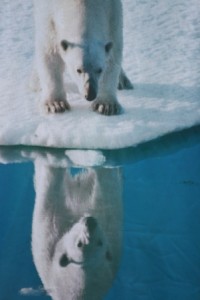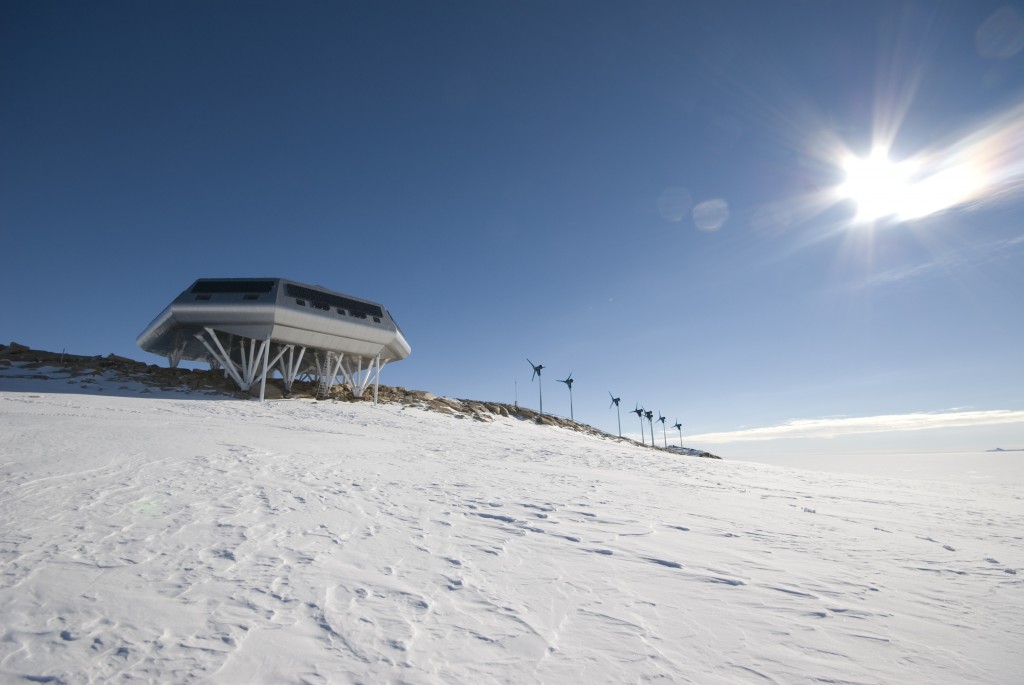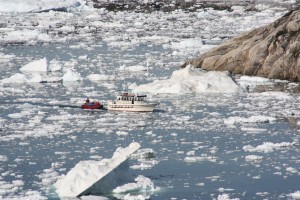Greenpeace criticizes draft Arctic oil spill response agreement

The symbol of an intact Arctic: A polar bear puts in an appearance on a poster at a Greenpeace “Save the Arctic” stand in Germany.
The Arctic Council environment ministers will be meeting in Jukkasjärvi in Sweden over the next few days. One of the items on the agenda is a long-awaited agreement on dealing with oil accidents in the Arctic. A copy of the document has been leaked, and Greenpeace says it is “vague and inadequate”. “Marine Oil Pollution Preparedness and Response in the Arctic” is the title of the paper, set to be adopted by the Council’s foreign ministers at their meeting in May. An oil spill in the Arctic would be very hard to tackle for various reasons, including remoteness, cold, ice, darkness and the fact that oil takes longer to break up in cold conditions. Remember the Exxon Valdez? If you are young enough not to, it was a tanker that went down in Prince William Sound in 1989, with devastating effects on the environment.. I visited the spot a couple of years ago, and there are still clumps of oil under stones on the beaches. And of course Shell is having its own problems with Arctic drilling at the moment.
Greenpeace is running an international campaign against oil drilling in the Arctic. Ben Ayliffe, head of the campaign, told the media: “This draft agreement does not inspire confidence in the ability of the Arctic Council to protect this fragile region when the worst happens. It’s incredibly vague, it fails to hold oil companies liable for the impact of their mistakes, and there is nothing here that ensures adequate capacity to deal with a spill in these nations”
I have been talking to a lot of experts on this over the last few years and most of them are convinced that a spill would happen sooner or later and would be extremely difficult to deal with. The risks to the fragile Arctic ecosystem would be enormous.
More snow less ice in the Antarctic

Princess Elisabeth Antarctica, Belgium’s research station
Copyright Ren̩ Robert РInternational Polar Foundation
Regular ice blog followers may remember a recent post including an Interview with Andrew Shepherd from Leeds University, UK, about ice melt in the Antarctic. One of the factors he explained was that increasing precipitation as a result of warming was falling on the East Antarctic ice sheet as snow and so increasing its mass. Although that particular study showed that the Antarctic has indeed been losing ice over the past 20 years, (contrary to popular opinion), increasing snow was balancing this loss to some extent. Now a study published in Nature shows that a lot of the ice increase from this snow is being lost again, because the extra snow puts pressure on the ice, making it flow faster towards the coast.
![]() read more
read more
Climate talks too slow for Antarctic sea snails

The pteropod, (marine snail) Limacina hilicina antarctica, Photo: Nina Bednarsek
While the climate negotiations continue at a snail’s pace in Doha, marine snails or pteropods in the Antarctic are losing their shells because of ocean acidification. Researchers from the British Antarctic Survey (BAS) and partners have published the first evidence of ocean acidification affecting live marine creatures in the Southern Ocean. Ocean acidification is caused by the uptake of carbon dioxide from the atmosphere emitted as a result of fossil fuel burning.
![]() read more
read more
Warming oceans mean smaller fish
Scientists at the University of British Columbia have just published a report in the journal Nature Climate Change indicating that fish will get smaller as climate change warms the oceans and reduces the oxygen available to fish in the water.
The scientists used computer models to come up with global projections. They have come to the conclusion that the maximum body weight of fish could go down by 14 to 20% between 2000 and 2050. The tropics would probably be the regions affected most.
The researchers were surprised at the large decrease the models are predicting. They think we may still be lacking some interesting “piece in the puzzle of understanding climate change effects in the ocean”, says lead author William Cheung from the UBC Fisheries Centre.
It seems likely that it would be harder for bigger fish to get enough oxygen in the water, so they would stop growing earlier. Clearly, this would have big impacts on food security. Fishy food for thought as international action still falls drastically short of what we’d need to limit warming to 2°C.
The Cold Edge – Visualizing polar climate impacts

The Dragon - Dave Walsh - davewalshphoto.com
On board the Greenpeace boat Esperanza at Svalbard for a story on scientists monitoring ocean acidification in 2010, I met Dave Walsh from Ireland, who was on board as Greenpeace press officer. Since then I have discovered his work as a photographer in his own right. These photos are art and appeals for environmental and climate action at the same time. Ice blog followers will enjoy his polar photos, spectacular and somehow moving. “While the frozen regions of our planet have the power to ignite imaginations, for most of the seven billion people on Earth, the Arctic and Antarctic remain abstract and unreachable”, says Dave. “ I’ve been lucky enough to voyage north and south by ship, to experience the serenity of the oceans and polar regions – and realise how finite ourplanet is.”
“The Cold Edge” exhibition of Dave’s pictures opens at The Copper House Gallery in Dublin this evening. I wish I could be there. In the meantime, those of us who can’t be there in person can share some inspiration and (aesthetic) food for thought online. The British newspaper the Guardian also features the pictures.






















Feedback